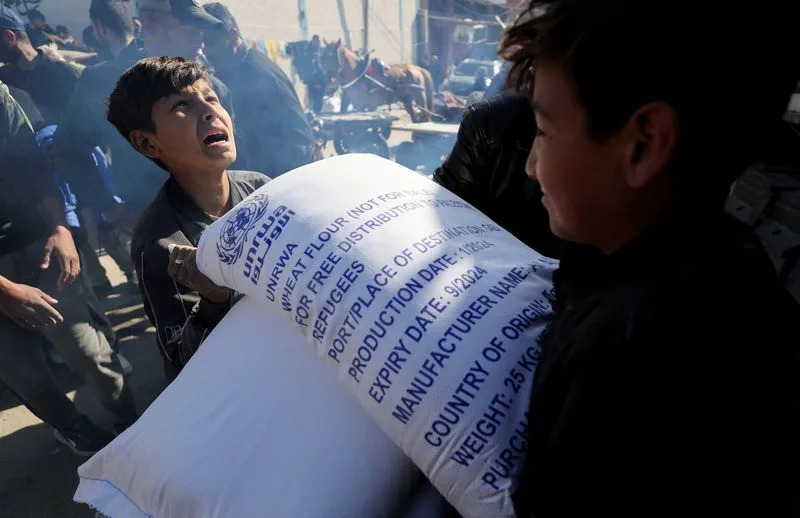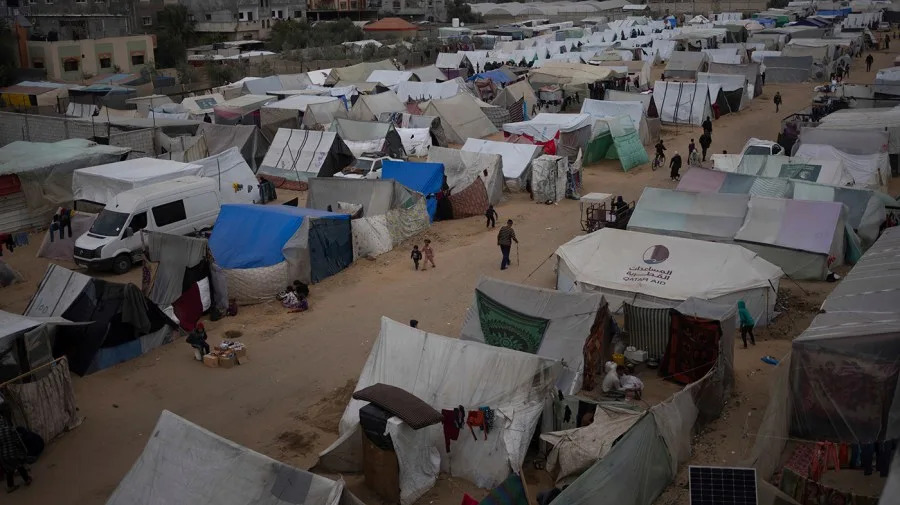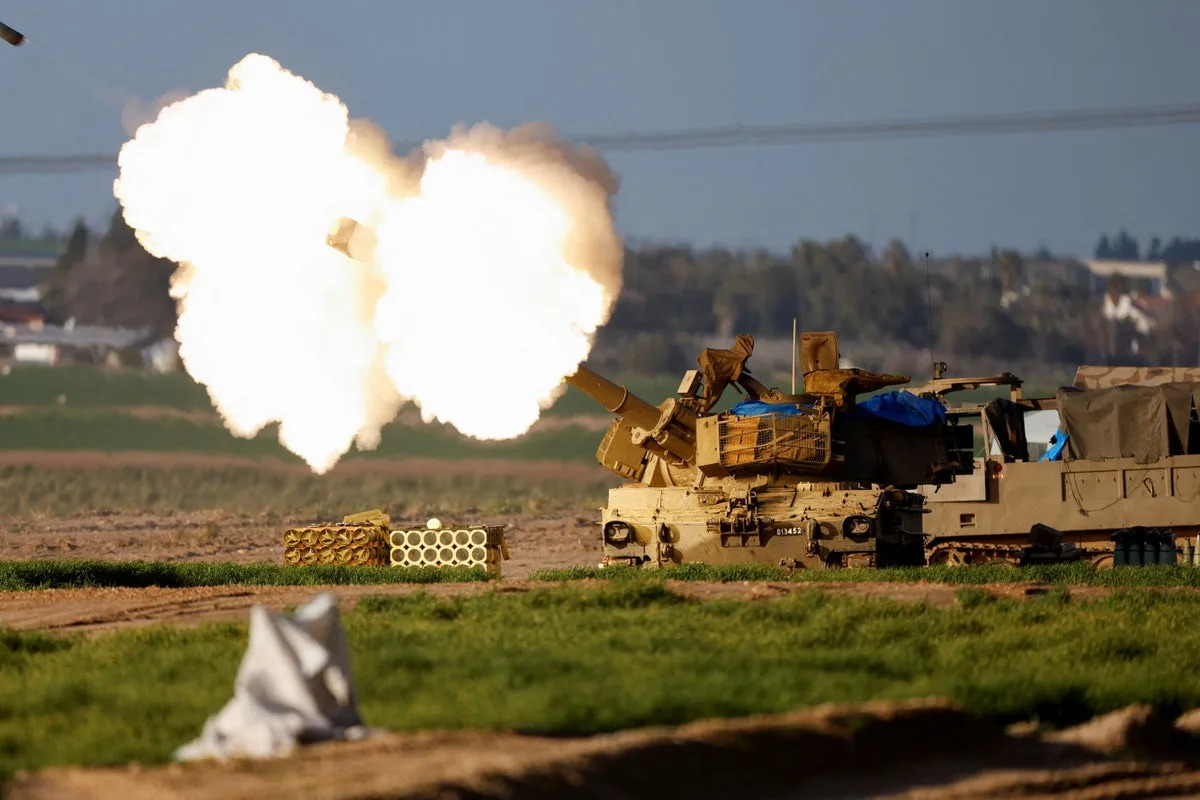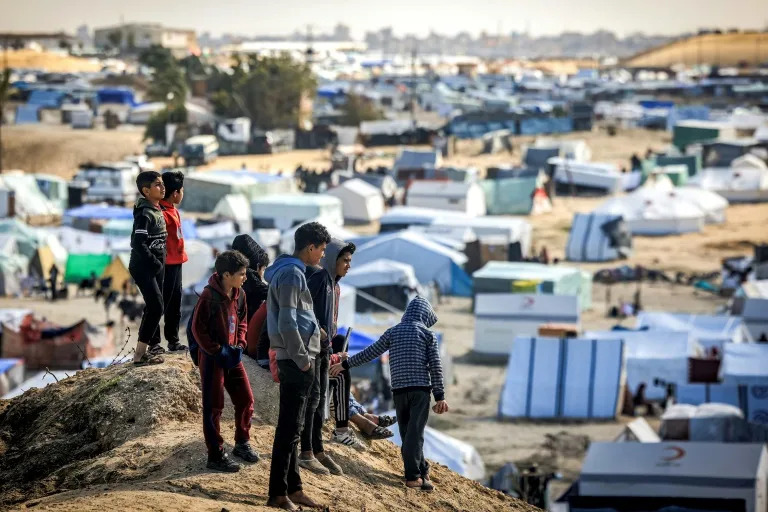The United Nations humanitarian office on Friday voiced concern about the hostilities in Khan Younis that have forced more people to flee to Rafah in the south of Gaza, describing the border town as a "pressure cooker of despair".
"I want to emphasize our deep concern about the escalation of hostilities in Khan Yunis, which has resulted in an increase in the number of internally displaced people seeking refuge in Rafah in recent days," said Jens Laerke, spokesperson for the United Nations Office for the Coordination of Humanitarian Affairs.
"Thousands of Palestinians have continued to flee to the south, which is already hosting over half the population of some 2.3 million people. ... Rafah is a pressure cooker of despair, and we fear for what comes next."
Israel’s military threatens to advance into last Gaza ‘safe zone’
Israel said troops would soon move into the refugee camp and city of Rafah, the last designated safe zone for Palestinian civilians in the besieged Gaza Strip where more than a million people are sequestered.
Israeli Defense Minister Yoav Gallant said Thursday that after achieving military objectives in the southern Gaza city of Khan Younis, forces would now enter Rafah, which is even farther south and located at the border with Egypt.
The move into Rafah renewed fears that Palestinian civilians will no longer have any place to flee the violence as nearly all of Gaza has now come under Israeli control. Israel has designated Rafah a safe zone, though critics say nowhere in Gaza is safe.
Some 1.7 million Palestinians are in Rafah after being displaced from their homes in Gaza, according to the United Nations. The city once had a population of around 250,000 people, making it immensely overcrowded.
The death toll in Gaza has already soared past 27,000, according to the Hamas-run Palestinian Health Ministry in Gaza.
Though Israel has faced international pressure to scale back its assault, Gallant said in a statement on X, formerly Twitter, that Israel must continue advancing to defeat Palestinian militant group Hamas.
“The great pressure that the forces exert on Hamas targets brings us closer to the return of the abductees, more than anything else,” Gallant said. “We will continue until the end, there is no other way.”
Iranian Telegram channels, which include statements from Hamas, claimed there were large Israeli airstrikes in both Khan Younis and Rafah on Friday.
The war has strained nearly every service in Gaza, even with humanitarian aid flowing in the strip with trucks. Communication blackouts are common, and Palestinians are struggling to secure basic necessities, including food and medical aid. Hospitals are struggling to stay online and treat patients while the U.N. has warned of a hunger crisis.
Stéphane Dujarric, spokesperson for the office of U.N.’s secretary-general, said he was “extremely” worried about increased military action in Rafah.
“We’ve already seen the impacts of the actions in Khan Younis,” he said. “Further south you get, the more densely populated it gets. … It is very worrying.”
Israel is fighting to defeat Hamas in retaliation for the militia group invading southern Israel and killing around 1,200 people, along with taking some 240 hostages. About 130 hostages remain in Gaza.
After two months of heavy fighting in northern Gaza, Israel began moving south, at the same time moving civilians to smaller and smaller safe zones. But Rafah has become the main destination for fleeing Palestinians.
James McGoldrick, the U.N.’s interim resident coordinator for the Palestinian people, said Rafah is now overwhelmed by people.
“As soon as you arrive through Rafah, what hits you straight away is the immensity of the people who are displaced: every street, every pavement,” he said earlier this month. “They also have these makeshift tents built onto the side of buildings encroaching on the roads. It’s very hard to move around. The place is really, really packed.”
Israel maintains that it must root out Hamas in every place fighters reside, accusing the militants of hiding behind civilians as shields.
Israel’s war aims have become elusive, with Hamas still intact after more than 100 days of war and the remaining hostages still not freed.
A potential deal has emerged to end the fighting, which would likely see a release of the 130 hostages for a pause in the war. But Israel has laid down a hard line amid the negotiations, pledging not to approve a cease-fire, which Hamas insists on for a hostage release.
Israeli Prime Minister Benjamin Netanyahu pledged earlier this week he would only stop after “total victory” in Gaza.
“Nothing less,” he said. “I am committed to it.”
Hundreds of thousands trapped near Gaza border with Israeli forces closing in: ‘Rafah was our final refuge’
An Israeli mobile artillery unit fires towards Gaza.
As Israel says its forces will push on towards the last city on the southern border of Gaza, the hundreds of thousands of Palestinians who have taken refuge in Rafah fear an assault that will leave them with nowhere to turn.
Rafah has seen its population skyrocket in the past four months, with Gaza residents fleeing as far south as they can to escape Israel’s war on Hamas. Many are sleeping in tents, makeshift shelters, schools and mosques.
Early on in the war, it was designated a safe zone by the Israeli military – but it has been hit by Israeli airstrikes on multiple occasions.
“We came here based on what the Israelis said, that it’s a safe place,” Mohammed Al-Jarah, 53, told The Independent. “And now they are threatening us again. Of course, we are afraid.”
Al-Jarah, like many in Rafah, went through an arduous journey to reach the city. After fleeing his home in Gaza City, in the north of the besieged territory, he first moved to the southern city of Khan Younis, before being pushed south into Rafah. He and his wife have taken shelter in a mosque, which has become a shared home with many other families.
“We thought Rafah was our final refuge,” said Abdul Hakim Abou Dagen, 33. “But I think the army will enter Rafah, just as it invaded every other part of Gaza. There is no safe place here.”
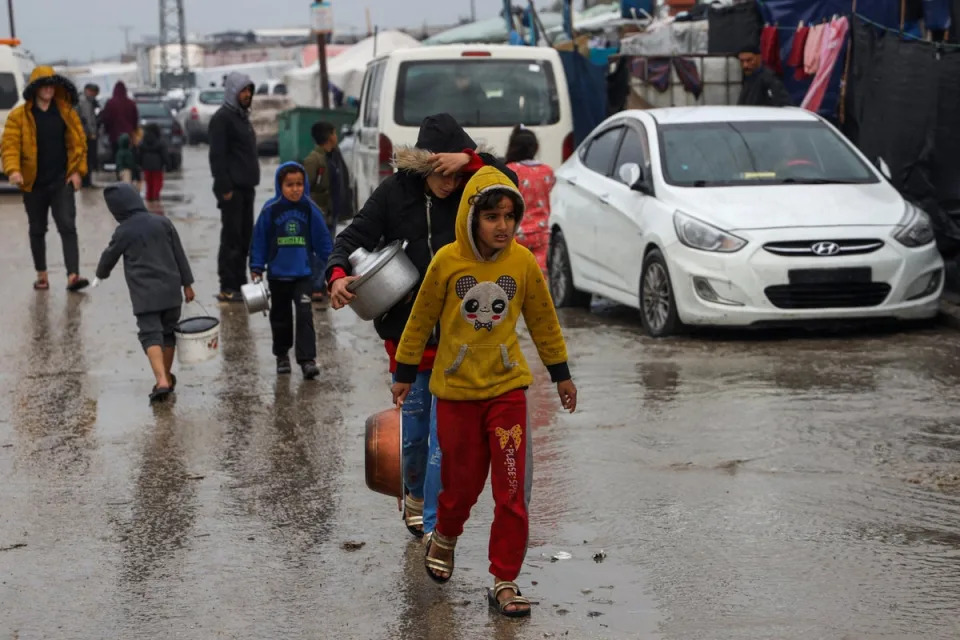
Israel launched airstrikes in Gaza, backed up by ground operations and a blockade, in the wake of a Hamas attack inside southern Israel on 7 October which saw around 1,200 people killed and around 240 taken back into Gaza as hostages. Health officials in Hamas-run Gaza say more than 27,000 people have been killed in the near four-month conflict. Imagery analysed by the UN Satellite Centre shows that 30 per cent of Gaza’s buildings have been destroyed or damaged in the Israeli offensive, while Unicef said it estimated that 17,000 children in Gaza were unaccompanied or had been separated from their families.
Dagen and his family have spent the past few months living in tents, and are now dealing with “unbearable cold” as the winter temperatures in Gaza have dropped below 10C. Heavy wind and rain are creating difficult conditions, blowing tents down and turning the ground they are planted on to sludge.
During a visit to the southern city of Khan Younis on Thursday, Israeli defence minister Yoav Gallant told a group of soldiers that the city’s Hamas brigade had been “dismantled” and the “same will happen in Rafah”. Israel launched one of its biggest assaults of the war on Khan Younis last week, in a bid to capture the city which is home to Hamas’s leader in Gaza, Yahya Sinwar.
Gallant said in a statement: “We are achieving our missions in Khan Younis, and we will also reach Rafah and eliminate terror elements that threaten us.”
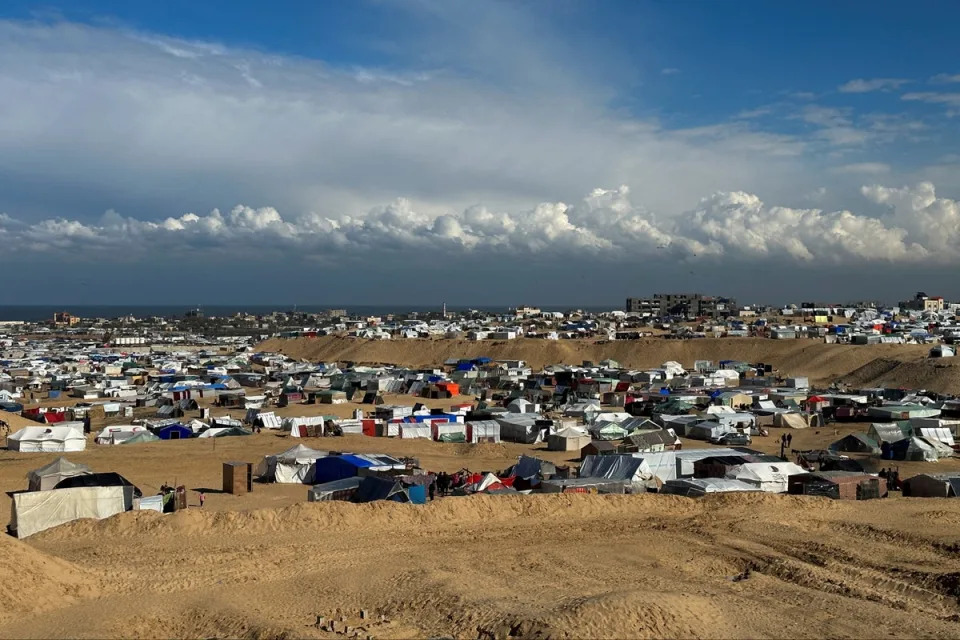
Rafah is the only part of the territory which has access to the heavily limited food and aid entering the territory, via its border crossing with Egypt. Along with the central area of Deir al-Balah, it is one of the last remaining districts that is yet to be victim of an Israeli ground assault.
Mohammed El-Burai, 43, from Sabra, Gaza City, described the situation in Rafah as “dire”, detailing food and water shortages, and widespread disease. “We have hope in our hearts that this war will end… We knew it would be violent, but not a horror movie.”
The United Nations described Rafah as a “pressure cooker of despair” as Palestinians continued to flee into the city.
“I want to emphasize our deep concern about the escalation of hostilities in Khan Younis, which has resulted in an increase in the number of internally displaced people seeking refuge in Rafah in recent days,” said Jens Laerke, spokesperson for the UN Office for the Coordination of Humanitarian Affairs.
“Thousands of Palestinians have continued to flee to the south, which is already hosting over half the population of some 2.3 million people. Rafah is a pressure cooker of despair, and we fear for what comes next.”
Israel and Hamas appear to be moving closer to a deal for the war’s first extended ceasefire. Mediators from Qatar and Egypt are awaiting a response from Hamas to a proposal drafted last week with Israeli and US spy chiefs, but it is clear there is still a gap to close. Hamas chief Ismail Haniyeh and Palestinian Islamic Jihad chief Ziad al-Nakhala said in a joint statement that “any negotiations should lead to a complete end to the aggression, the withdrawal of the occupation army outside the Gaza Strip, the lifting of the siege” as well as reconstruction, provision of Gaza’s basic needs and a full exchange of captives.
'No space for everyone': Rafah overwhelmed with fleeing Gazans
The UN estimates 1.7 million have been forced from their homes by the war since October 7
Tens
of thousands of people crammed into a street in Rafah, the southern Gaza city where vast numbers have sought refuge from advancing Israeli ground troops.
"These are the worst months of our lives," said Noha al-Madhun, who fled from the Beit Lahia area of northern Gaza and was taken in by relatives along with some of her children.
"My husband and eldest sons sleep in a tent. There's no space for everyone. We sleep on the floor and we feel the cold" without enough blankets to go round, she said.
"There aren't enough apartments or even places to set up extra tents," added Madhun.
More than half of Gaza's population of 2.4 million is in Rafah, on the border with Egypt, according to the United Nations.
Those without relatives to host them or the means to rent apartments have found themselves in tents wherever there is space: along streets, in public squares, sports stadiums or parks.
Abdulkarim Misbah, 32, said he left his home in the northern Jabalia refugee camp and reached Khan Yunis, only to be uprooted once more.
"We escaped last week from death in Khan Yunis, without bringing anything with us. We didn't find a place to stay. We slept on the streets the first two nights. The women and children slept in a mosque," he said.
Then they received a donated tent, setting it up right beside the Egyptian border.
"My four children are shivering from the cold. They feel sick and unwell all the time," said Misbah.
- Forced to flee south -
Most people are concentrated in the city centre or west, trying to avoid the eastern edges towards the Israeli border or the north which is dangerously close to fighting in nearby Khan Yunis.
After the war erupted on October 7 with Hamas militants' unprecedented attack on Israel, the country's military ordered Gazans to leave their homes in the north.
Those instructions have since expanded, forcing many Palestinians to flee time and again.
Gaza City resident Amjad Abdel Aal, who fled to a school shelter in Rafah, said it took her two hours to be driven a distance which before the war would take just 15 minutes.
"The congestion was awful," she said, waiting in a wheelchair in a long line for donations of blankets and mattresses.
"There aren't a lot of cars because of the fuel shortage. Everyone walks, rides a truck or donkey cart," added the barefoot 28-year-old.
The United Nations estimates 1.7 million have been forced from their homes by the war since October 7.
The Hamas attack on Israel resulted in the deaths of around 1,160 people, mostly civilians, according to an AFP tally based on official figures.
Israel's withering offensive has killed at least 27,131 people in Gaza, mostly women and children, according to the health ministry in the Hamas-run territory.
- 'Death is more merciful' -
With Egypt's border firmly shut to most Gazans throughout the war, the streets of Rafah have become packed with displaced people.
Mehran Dabbabish, 41, a taxi driver from Khan Yunis, said the situation was "getting worse by the day".
"The road between Khan Yunis and Rafah used to take 20 to 30 minutes at worst. Today, the shortest trip within Rafah takes an hour and a half to two hours," he told AFP.
The overcrowding is putting a massive strain on everyone and means moving anywhere, by any means, is incredibly difficult.
Another Gazan, Naima al-Bayumi, lamented how tired she was just halfway through a four-hour journey by foot to visit her relative in hospital.
"I rode a donkey cart a few times and fell off because of the intense scramble," she told AFP.
Bayumi started crying as she recounted the bombardment which hit her home, killing her baby twins.
"I gave birth to them in the first week of the war, after 13 years of marriage," said the 38-year-old, who lives in a tent with her husband.
"I don't want to live anymore," she said.
Elsewhere on the road, people helped another woman clamber aboard a truck filled with dozens of passengers.
She clung to the side of the truck with her baby, to stop them falling out, and screamed: "Death is more merciful than this life!"
The EU is worried that Israel might extend the war in Gaza to a 'pressure cooker' town near Egypt
The European Union on Saturday expressed deep concern over reports that the Israeli military intends to take its battle against Hamas to the town of Rafah at Gaza’s border with Egypt where more than a million people have escaped the fighting.
The EU’s top diplomat warned that conflict is likely to spread throughout the region unless a cease-fire is agreed between Israel and Hamas, after U.S. airstrikes hit dozens of sites in Iraq and Syria used by Iranian-backed militias and the Iranian Revolutionary Guard.
EU foreign policy chief Josep Borrell said that around 1 million Palestinians “have been displaced progressively against the Egyptian border. They claimed they were safe zones, but in fact what we see is that the bombing affecting the civilian population continues and it is creating a very dire situation.”
Israeli Defense Minister Yoav Gallant said Thursday that after Israeli troops seize the southern city of Khan Younis, from where tens of thousands of people have fled, they will move on to Rafah. He did not give a time frame.
Such an offensive could push the refugees into Egypt, undermining Israel's peace agreement with the country and angering the United States. It might also torpedo slow-moving peace talks with Hamas and complicate efforts to release scores of Israelis abducted when the militant group rampaged through southern Israel on Oct. 7.
The prospect of a ground war in Rafah has raised fears about where the population would go to find safety. The United Nations said the town is becoming a “ pressure cooker of despair.”
Speaking in Brussels, where he was chairing informal talks among EU foreign ministers, Borrell said that the Israel-Hamas war has created “a domino effect,” with conflict also erupting in Lebanon, Iraq, Syria and in the Red Sea area.
“We are living a critical situation in the Middle East, in the whole region,” he said. “As long as the war in Gaza continues, it is very difficult to believe that the situation in the Red Sea will improve, because one thing is related with the other.”
Belgian Foreign Minister Hadja Lahbib, whose country currently holds the EU’s rotating presidency, warned of “a real risk of spillover of the conflict.”
“It’s a huge concern. We ask for restraint, and we ask for dialogue and diplomacy. It’s the only way we can calm down the situation in the Middle East,” she told reporters.
Radek Sikorski, the foreign minister of Poland, a staunch U.S. ally, said those targeted in the U.S. airstrikes had it coming. “Iran’s proxies have played with fire for months and years and it’s now burning them,” he said.
Austrian Foreign Minister Alexander Schallenberg said he believes “that those who are attacking U.S. bases have to know that they are actually pouring oil into the fire.” He warned that ”this is a powder keg, the whole Middle East, and there are too many people running around with matches.”
After the meeting, Borrell also expressed concern about the fate of the U.N. relief agency working with the Palestinians, after 12 UNRWA staff were accused of involvement in the Oct. 7 attacks, leading the United States and others to pull funding from Gaza's biggest humanitarian aid provider.
Borrell said the majority of ministers present from the 27 EU nations believe that UNRWA’s work is vital. While some countries have frozen their support, Borrell said that other ministers informed him that their governments would step up funding. He did not name them.
“UNRWA has been playing a critical role to support the Palestinian refugees, and not only in Gaza” but also in Lebanon and Jordan, Borrell said. “Who can substitute that overnight?” He said the EU welcomes the investigation launched by the agency.
Borrell also noted that Israel had been critical of UNRWA’s work for many years.



